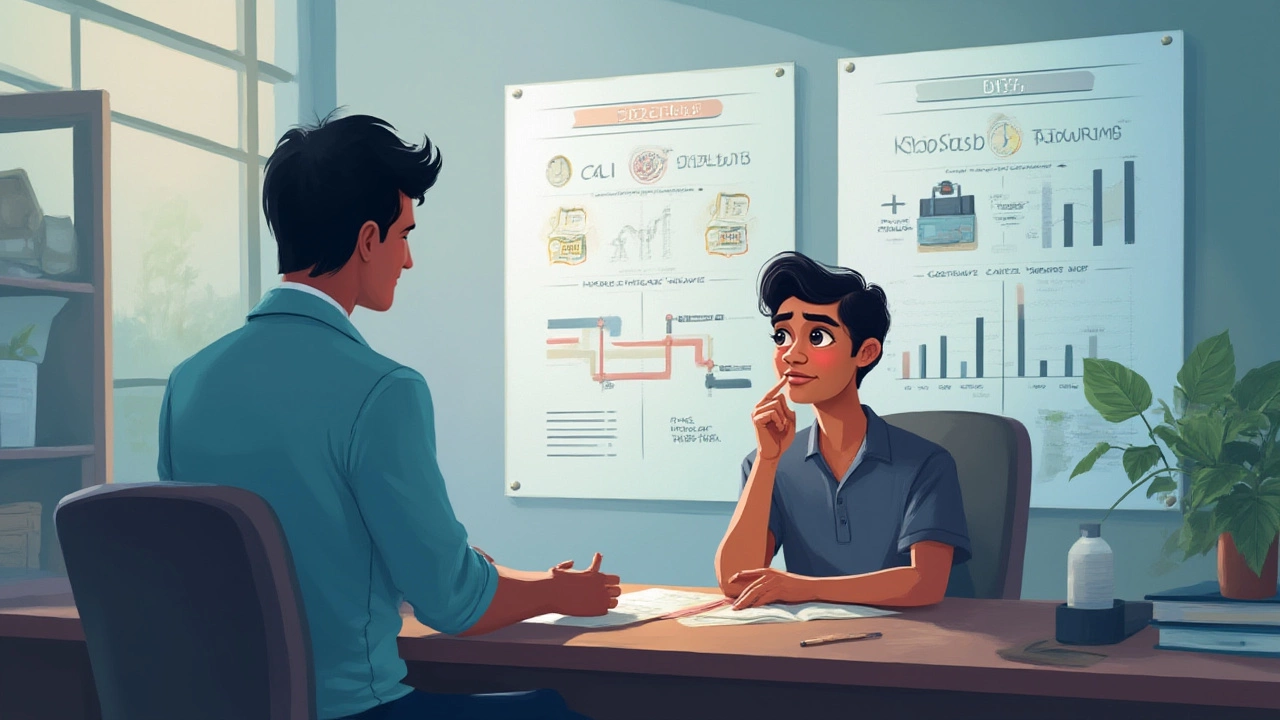People have strong opinions about education, but nobody tells you how complicated that choice can get until you're in the thick of it. Stand at the crossroads, trying to pick between a degree or a diploma, and the advice just gets louder—not clearer. Still, it matters. The gap between these two isn’t just about time in a classroom—it's about how you’ll be shaped as a professional and as a person. Some say a degree is an open door to the world, others swear by the practicality and speed of a diploma. So which one really puts you ahead? The answer depends on more than just what looks good on a CV.
What Actually Is a Degree—and a Diploma?
Here’s the thing—people casually toss around 'degree' and 'diploma' like they’re interchangeable. They’re not. Let’s talk brass tacks. In the UK, a degree usually takes three or four years full-time at university (unless you’re in Scotland—then four is typical, thanks to the tradition of broader study at the start). You’ll pick up a deep pool of knowledge. Your studies will mix theory with some hands-on work, often with a research or dissertation project before you’re done. The most common are Bachelor of Arts (BA), Bachelor of Science (BSc), or Bachelor of Engineering (BEng). Then there are foundation degrees and Master’s on the next rung, but for most, the Bachelor’s path is the classic.
Now, diplomas—especially Higher National Diplomas (HND) and National Diplomas—land you in a different space. They’re shorter: usually one to two years. They don’t typically dive so deep into the theory, but they get you trained fast for a particular job. Think hairdressing, plumbing, computing, hospitality, or business admin. A diploma focuses on the exact skills you’ll use at work, often tagging on time with real employers. If you want a job, and you want it soon, this route speaks your language.
The difference isn’t just paperwork—it’s the whole educational approach. Degrees stretch you for the long-haul: critical thinking, research, sometimes a sprinkle of philosophy. Diplomas get you ‘job-ready’ with no fluff, often kicking off with a work placement straight out of the gate. Here’s a quick comparison:
| Degree | Diploma |
|---|---|
| 3–4 years (full time) | 1–2 years |
| University | College/Training Centre |
| Theory, research, broad skills | Focused, practical, career-specific |
| Often leads to higher qualifications | Leads to employment or further training |
| More expensive | Usually cheaper |
Now that you know the nuts and bolts, let’s talk about what matters most: your life after graduation.
Costs, Time, and the Money Question
Money always finds its way into every education conversation. Degrees in the UK aren’t cheap. Tuition can run up to £9,250 a year for home students (and that’s not counting rent, food, or a pint after lectures). By graduation, most students are looking at £27,000 or more in tuition debt alone—not even blinking at maintenance loans. Yes, there’s help from Student Finance, but that debt is real. On average, UK university grads walk away with about £45,000 in total student loan debt if you count living costs. That’s a lot to lug into your 20s.
Now, put a diploma or HND under the microscope. Course fees for HNDs are much, much lower—often £6,000 to £7,000 in total, less if you study at a college rather than a university. Plus, you save one or even two years of your life. That’s at least 12 to 24 months in the workforce—earning money, building skills, maybe even getting promoted while degree mates are still cramming for finals. With lower debt and a head start on earnings, you could actually be better off financially, especially in careers like construction, IT support, care work, or hospitality management.
But here’s a twist: don’t assume degrees are always the more expensive route. For certain jobs (think medicine, law, engineering, teaching), a diploma won’t cut it at all—employers require a specific degree. That means time and money spent on a diploma can sometimes delay you, rather than speeding things up.
There’s something else to remember, too. If you’re keen on university but worried about cost, some diplomas (like an HND) can be a stepping stone—do two years at college, then ‘top up’ to a full degree with one more year. It’s a way to test the waters, save money, and avoid big commitments upfront.

Employment, Progression, and How Employers Think
So, which actually lands you the job? The truth’s muddier than most admissions brochures claim. In the UK, across loads of sectors, employers care more about your attitude, skills, and experience than your qualification’s exact label. That said, here’s what the numbers say:
- 86% of UK graduates are in work or further study within six months after finishing university (according to the 2024 HESA Graduate Outcomes Survey).
- Graduates with STEM (science, tech, engineering, maths) degrees see higher starting salaries – think £28,000+ as a starting point versus the UK median of £23,000 for most diploma-level roles.
- For many ‘hands-on’ jobs—like plumbing, hairdressing, or culinary arts—a diploma is the industry standard, and employers actually look for them.
- Some sectors desperately need people with diplomas: UK trade construction, for example, has a 2025 skills gap of 250,000 roles, and most don’t require degrees at all.
No single path guarantees a dream job. But there are patterns: if you want to work in sectors like law, finance, healthcare, or scientific research, the door usually needs a degree key. For things like IT support, software testing, advanced manufacturing, or creative roles in design, you can land an entry-level job with a diploma and work your way up. And don’t forget the old-school, stubborn requirement for professional registration—nursing, teaching, or accountancy all require specific degrees and professional body approval.
Is there stigma against diplomas? Less than you’d think nowadays. Big companies often value experience and skills over degree snobbery, especially since COVID shifted priorities and remote work changed hiring. LinkedIn’s 2025 UK Job Report shows a sharp rise in employers adopting “skills-first” hiring, giving talented diploma holders a real shot. Apprenticeships, which blend diploma-level learning and work, are more respected than ever before.
The wildcard is career progression. Senior roles and management are still, for the most part, dominated by degree holders. Some industries tag advancement to having a degree—not fair, but real. But that trend is shifting fast, especially in industries like tech or digital marketing, where rapid change outpaces university textbooks. Learn to code in six months, land a diploma, and you might leapfrog a room full of degree holders.
What Matters for You? Personal Fit and Long-Term View
Flip through your options, and it’s easy to get swept up in what everyone else is doing. But what works for one mate won’t always work for you. So, how do you pick?
- If you love a subject and think you might go into a related profession—say, you can’t stop talking about history, languages, or chemistry—a degree gives you time and space to go deep.
- If you get antsy in a lecture hall, prefer hands-on learning, or want to earn your own money fast, a diploma or HND is the short road to the working world.
- Ask yourself: “Where do my natural talents lead me?” If you love to fix cars, build websites, create art, or cook brilliant food, a diploma plugs right into action without much fuss.
- But remember: your choice isn’t set in stone. Loads of people start with a diploma, work for a year or two, and then decide to 'top up' with a degree—often with some credits carrying over.
- Consider the “what if” factor. If you think you’ll want to travel, work abroad, or change fields later, degrees tend to open more doors internationally. In countries like Canada or Australia, certain jobs won’t even consider applicants without a bachelor’s degree.
Still can’t decide? Put together a quick table for yourself:
| Factor | Degree | Diploma |
|---|---|---|
| Time to finish | 3–4 years | 1–2 years |
| Cost (UK, average, tuition and fees) | £27,750+ | £7,000–£10,000 |
| Employability | Higher in certain fields | Quick entry for practical jobs |
| Flexibility | Wider choice, better for travel | Direct, job-specific |
| Future study | Can lead to postgraduate study | May need top-up to reach higher levels |
And one tip nobody gives enough weight: talk to people who actually have the jobs you’re aiming for. Not just career advisors, but real people slogging away in the field. They often give the most honest advice about what matters and what doesn’t. Edinburgh, for example, is crammed with tech start-ups where founders never finished university, but there are just as many sectors clinging to tradition.

Rethinking What “Success” Looks Like
Here’s the weird truth hiding behind all those glossy prospectuses and career nights: there’s no one-size-fits-all answer. Success isn’t just the paper you get at the end—it’s building a life that fits you. Plenty of brilliant, miserable people regret slogging through a degree for the wrong reasons. Just as many wish they’d stuck at college and learned a trade, instead of heading off to uni just for the party scene.
The world is changing fast—way faster than universities can keep up. In the last five years, the number of UK students doing higher apprenticeships or 'mid-career' diplomas has doubled. Same with online learning—open universities and private providers have made it possible to upskill whenever you need, not just in your early 20s. In 2025, nearly half of British workers say they're willing to retrain, often with short, sharp diplomas or certificates rather than years-long degrees.
So, don’t get stuck on labels. Ask yourself what puts you in the best spot for the life you want—whether it’s getting hands-on as soon as possible or spending a few years thinking, exploring, and building a wide knowledge base. The mistake isn’t picking the wrong path—it’s thinking you can’t change course later. The education world is more flexible than ever. If you stay curious, honest about your strengths, and open to shifting direction, you win the long game.
Bottom line? Whether you pick a degree vs diploma route, just make sure it matches the future you imagine for yourself. Everything else—title, status, pay slips—follows when you back yourself to play to your strengths. That's not advice you’ll find in most official guides, but it’s the truth most folks discover as soon as they leave the classroom behind.




